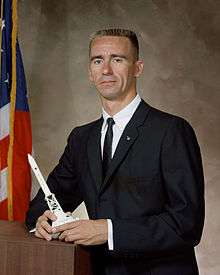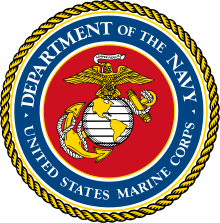Walter Cunningham
| R. Walter Cunningham | |
|---|---|
 | |
| NASA Astronaut | |
| Nationality | American |
| Status | Retired |
| Born |
March 16, 1932 Creston, Iowa, U.S. |
Other names | Ronnie Walter Cunningham |
Other occupation | Fighter pilot, physicist |
| UCLA, B.A. 1960, M.A. 1961 | |
| Rank | Colonel, USMCR |
Time in space | 10d 20h 08m |
| Selection | 1963 NASA Group 3 |
| Missions | Apollo 7 |
Mission insignia |
|
| Retirement | August 1, 1971 |
| Awards |
|
Ronnie Walter Cunningham (born March 16, 1932), (Col, USMCR, Ret.), better known as Walt Cunningham, is a retired American astronaut. In 1968, he was the Lunar Module Pilot on the Apollo 7 mission. He was NASA's third civilian astronaut (after Neil Armstrong and Elliot See), and has also been a fighter pilot, physicist, entrepreneur, venture capitalist, author of The All-American Boys, lecturer, and host of the radio show Lift-off to Logic. Walter Cunningham attended UCLA.
Biography
Early life, education and military career
Cunningham was born in Creston, Iowa on March 16, 1932. He graduated from Venice High School in Venice, California, where a building has since been named for him.
After high school, Cunningham joined the U.S. Navy in 1951, and began flight training in 1952. He served on active duty as a fighter pilot with the U.S. Marine Corps from 1953 until 1956. From 1956 to 1975 he served in the Marine Corps Reserve program, ultimately retiring at the rank of Colonel.
Cunningham received his Bachelor of Arts degree with honors in 1960, and his Master of Arts degree with distinction in 1961, both in Physics, from the University of California at Los Angeles. He then worked as a scientist for the RAND Corporation while pursuing a doctorate.

NASA career
In October 1963, Cunningham was one of the third group of astronauts selected by NASA. On October 11, 1968, he occupied the Lunar Module Pilot seat for the eleven-day flight of Apollo 7. Although the flight carried no Lunar Module, Cunningham was kept busy with the myriad system tests aboard this first launch of a manned Apollo mission. Because Schirra, Cunningham, and Eisele ran afoul of NASA management during the flight, none of them were assigned to future missions. He then worked in a management role for Skylab and left NASA in 1971.
He has accumulated more than 4,500 hours of flying time, including more than 3,400 in jet aircraft and 263 hours in space.
Post-NASA career
In 1974, Cunningham graduated from Harvard Business School's Advanced Management Program and later worked as a businessman and investor in a number of private ventures.
In 1977, he published The All-American Boys, a reminiscence of his astronaut days. Cunningham composed the text for the book himself without the help of a ghostwriter. He was also a major contributor and foreword-writer for the 2007 space history book In the Shadow of the Moon.
In 2008, NASA awarded Cunningham the NASA Distinguished Service Medal for his Apollo 7 mission.[1]
He is a radio personality and public speaker.
Global warming views
Cunningham rejects the scientific consensus regarding anthropogenic global warming (AGW). In 2010, he published a pamphlet titled "Global Warming: Facts versus Faith" in which he states: "The current debate is not unlike Galileo's historic disagreement with the Catholic Church, or the battle over evolution versus creationism. In all three cases, facts are pitted against faith and science against religion. The conflict over global warming has deteriorated into a religious war between true believers in AGW and non-believers, the so-called "skeptics"."[2] This report was published by the Heartland Institute, a conservative think tank engaged in "dispelling myths about global warming".
In an editorial published in the Houston Chronicle on August 15, 2010, Cunningham argued that the empirical evidence does not support the claims of global warming. The editorial, titled "Climate change alarmists ignore scientific methods", stated his opinion that the global warming debate hinged on four key points. "About 20 years ago," he stated, "a small group of scientists became concerned that temperatures around the Earth were unreasonably high and a threat to humanity. In their infinite wisdom, they decided: 1) that CO2 (carbon dioxide) levels were abnormally high, 2) that higher levels of CO2 were bad for humanity, 3) that warmer temperatures would be worse for the world, and 4) that we are capable of overriding natural forces to control the Earth's temperature. Not one of these presumptions (opinions) has proven to be valid."[3]
Organizations
Cunningham is a member of numerous organizations. He is an associate fellow of the American Institute of Aeronautics and Astronautics, fellow of the American Astronautical Society, member of the Society of Experimental Test Pilots, American Geophysical Union, Explorers Club, Sigma Pi Sigma and Sigma Xi, Association of Space Explorers, Houston American Revolution Bicentennial Commission, Aviation Subcommittee, Houston Chamber of Commerce, Earth Awareness Foundation, National Association of Small Business Investment Companies.[4]
Awards and honors
Cunningham is a recipient of numerous national and international honors, including:
- NASA Distinguished Service Medal
- NASA Exceptional Service Medal
- AIAA Haley Astronautics Award, 1969
- UCLA Professional Achievement Award, 1969
- Special Trustees Award, National Academy of Television Arts and Sciences (Emmy Award), 1969
- Medal of Valor, American Legion, 1975
- Outstanding American Award, American Conservative Union, 1975
- Listed in all major Who's Whos
- George Haddaway Award, 2000
- Houston Hall of Fame
- International Space Hall of Fame, inducted in 1983
- U.S. Astronaut Hall of Fame, inducted in 1997
- Iowa Aviation Hall of Fame, inducted in 2003
- San Diego Air and Space Hall of Fame.[5]
Media portrayals
In the 1998 HBO miniseries From the Earth to the Moon Cunningham was played by Fredric Lehne.
References
- ↑ "First Apollo flight crew last to be honored". collectSPACE. Retrieved 2008-10-20.
- ↑ Cunningham, Walter (2010). Global Warming: Facts versus Faith: One Astronaut's Views (PDF). Chicago, Illinois: The Heartland Institute. p. 2. ISBN 978-1-934791-30-1. Retrieved April 3, 2012.
- ↑ Cunningham, Walter (August 15, 2010). "Climate change alarmists ignore scientific methods". Houston Chronicle. Retrieved April 3, 2012.
- ↑ Walter Cunningham's memberships
- ↑ Walter Cunningham's awards and honors
3. ^ a b c d Heartland Institute's "Instant Expert Guide: Global Warming" retrieved 4 March 2008
Notes
- "Biographical Data: Walter Cunningham". Astronaut Biographies. NASA. December 1994. Retrieved March 21, 2009.
Further reading
- Cunningham, Walter (1977). The All-American Boys. MacMillan Publishing Company. ISBN 0-02-529240-4.
- French, Francis and Colin Burgess (2007). In the Shadow of the Moon: A Challenging Journey to Tranquility. University of Nebraska Press. ISBN 978-0-8032-1128-5.
External links
| Wikimedia Commons has media related to Walter Cunningham. |
- Official website of Walter Cunningham
- Cunningham's official NASA biography
- Astronautix biography of Walter Cunningham
- Walter Cunningham at the Internet Movie Database
- Cunningham at Encyclopedia of Science
- Cunningham at International Space Hall of Fame
- Walt Cunningham on The George Jarkesy Show
